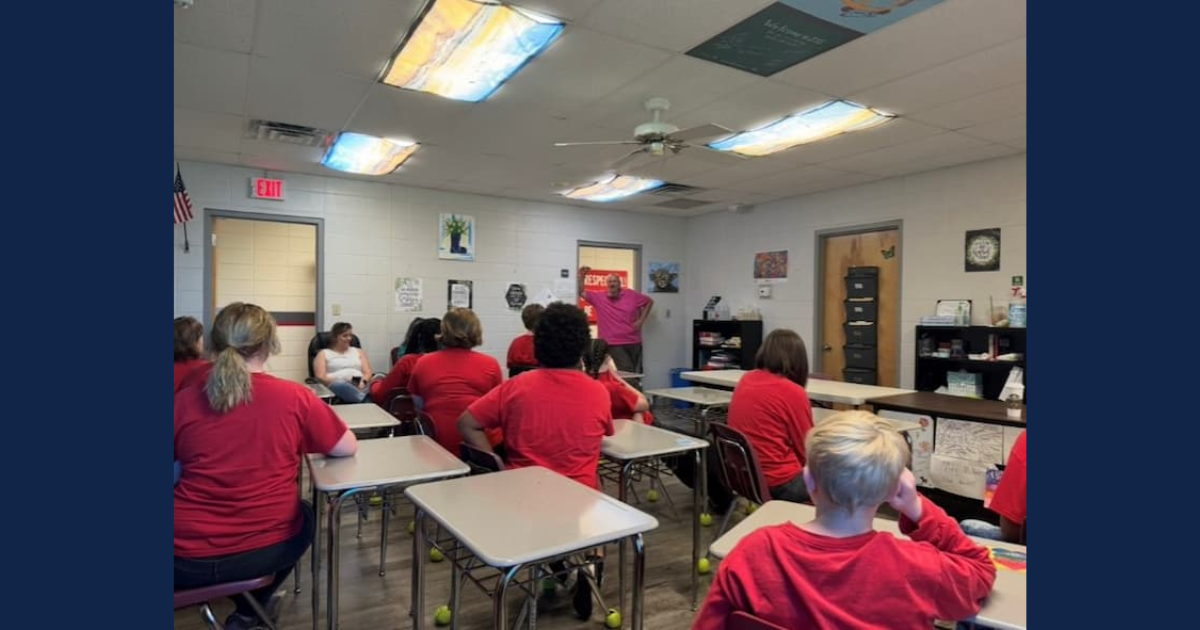Jack “JJ” Spurlin: A Lifetime of Inspiring and Supporting Youth
Office of Communications and Marketing
Young Hall
820 Chestnut Street
Jefferson City, MO 65101
 Jack “JJ” Spurlin teaches students about agriculture in a classroom at the Turnaround Ranch in Joplin, Missouri.
Jack “JJ” Spurlin teaches students about agriculture in a classroom at the Turnaround Ranch in Joplin, Missouri.
For Jack “JJ” Spurlin, helping young people isn’t just a career — it’s a calling that has shaped every chapter of his life. From the very beginning, Spurlin has dedicated himself to mentoring, guiding and supporting youth in their journeys toward brighter futures. Over the years, he has worked as a social worker, academic advisor, coach and counselor, wearing many hats but always keeping the same mission: to make a positive difference in the lives of children and teens.
Now in retirement, Spurlin stepped away from full-time work, but his passion for serving youth has not faded.
Instead, it has evolved.
Today, he works part-time with Lincoln University’s Innovative Small Farmers' Outreach Program (ISFOP), where he continues to change lives — one conversation, one lesson and one opportunity at a time.
In his role with ISFOP, Spurlin focuses on expanding Lincoln University’s outreach to underserved and often overlooked youth throughout Missouri.
Spurlin’s commitment has led him to forge connections not only with traditional schools but also with alternative programs and residential facilities that support youth facing greater challenges. One of the most impactful partnerships he has cultivated is with the Ozark Center’s Turnaround Ranch in Joplin.
The Ozark Center is a class-four residential treatment facility providing intensive care for children and adolescents with significant emotional or behavioral needs. Its Turnaround Ranch program, established more than 30 years ago, was designed to give these young people a safe, supportive environment where they can begin to heal and grow.
Turnaround Ranch includes six cottages, an on-site school, a gymnasium and expansive outdoor areas for recreation and hands-on learning. It recently underwent a $10.5 million renovation to enhance its ability to serve its residents, ensuring youth not only receive the care they need but also experience an environment encouraging personal growth and positive change.
Spurlin plays a unique role at the ranch. When invited, he leads group sessions engaging students with topics that resonate deeply with them. Often, his sessions focus on urban farming. He shares how growing food, caring for plants and understanding where our food comes from can open doors for self-reliance and future careers.
While Turnaround Ranch is a significant focus, Spurlin’s outreach does not stop there. He envisions expanding Lincoln University’s impact to other alternative learning environments, as well as traditional schools and even homeschool networks. His goal is to reach as many young people as possible, sharing lessons that inspire curiosity, build confidence and connect youth to meaningful opportunities.
Spurlin’s work with ISFOP is more than just an extension of his career; it is a deeply fulfilling chapter of his life. He said retirement is not about slowing down; it is about choosing work that is meaningful.
This autonomy allows him to follow his heart, devoting his time to projects aligning with his values. Whether he is standing in a classroom at Turnaround Ranch or speaking to a group of homeschoolers, Spurlin approaches every interaction with a sense of purpose and optimism. He knows the lessons he shares can make a lasting impression.
Spurlin’s journey is a testament to the impact that one person can have when they dedicate their life to helping others.
Through his efforts, Spurlin is not only supporting Lincoln University’s mission but also building a legacy of care, education and empowerment. He is proof retirement can be a beginning rather than an end — a chance to channel experience, passion and purpose into truly meaningful work.
“Outreach has always been, and will always be, my jam,” Spurlin said.
The Innovative Small Farmer’s Outreach Program is part of Lincoln University Cooperative Extension (LUCE). Its mission is to assist small farmers, with a special focus on underrepresented and underserved populations, as they navigate the many challenges of producing food, raising livestock and maintaining financial stability.
In addition to supporting traditional rural farmers, ISFOP also places emphasis on urban food production in Missouri’s larger population centers. This urban focus not only promotes local food access but also provides new opportunities for urban youth, who are often considered an underrepresented group in agriculture. Through workshops, hands-on training and community partnerships, ISFOP empowers individuals and families to build sustainable farm operations and connect agriculture to their everyday lives.
